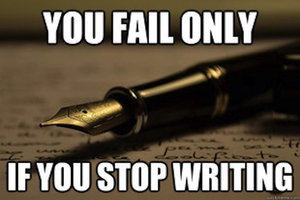Lit magazines are the heart of collegiate writing, especially for creative writers. Where else will self-conscious english majors be able to get their writing published? Getting published is the best way for writers to get exposure and I mean come on, I know that I can leave randomly thrown together short stories to just sit and stew on my computer for about 600 years. Without forcing myself to submit poorly edited drafts to lit mags last minute on the day before they are due, no one would ever read anything I write. But what happens when you get flat out rejected? What happens when you get dumped by a lit mag?
Dealing with Rejection 101: You Probably Deserve It
Having a nameless editor tell you that you aren’t good enough to be a part of whatever publication you applied to can be a debilitating event but, sadly, also sometimes a justified one. Editors of publications aren’t nameless, faceless, evil gatekeepers of the literary world, preventing doe-eyed young writers from crossing the threshold into the world of literary acclaim, they are experts. Editors look through countless submissions every time their publication goes to print and they are avid readers and writers themselves. If anyone is qualified to determine the objective quality of writing, it is them. If you get rejected from a lit mag, or any publication, it is probably because you aren’t a good enough writer yet, but don’t let that discourage you! In fact, it should motivate you.
Writing is such a strange and weird profession; it is one of the only crafts that has no apprenticeship. Sure you can take all of the creative writing classes that you want but no matter who you are, when you start out as a writer, you are going to suck at it. That is a very hard truth that a lot of writers struggle with, not the accepting that they suck part (most writers think that) but acknowledging that in order to be a good writer, you have to suck for a very long time before you get good, is a revelation. A disheartening, freeing, amazing, terrible revelation.
It is so easy, especially when you are a young writer, to get sucked into the “I need to be F. Scott Fitzgerald and I need to be him NOW” state of mind. This is inherently detrimental to your own growth as a writer. You need to be YOU, even if that you sucks right now, because ya know what? If you stick with the you that sucks now , later you are going to grow into a you that is a fantastic writer. So of course that high and mighty college lit mag rejected you, you aren’t done cooking yet. You have to suck for a little longer. You have to sit on the stoop of the literary world for just a little while longer.

How to Train Your Creativity: Not Sucking
How to be a good writer, a list by Patrick:
Step 1: Write
Step 2: Write
Step 3: Write
Step 4: Write
It’s that easy. And that hard.
Robert Frost once wrote, “The best way out is always through” and I find that to be true. The only way to be a good writer is to write and keep writing. Write, finish, and write again. Rejection is a part of that process, I could give huge lists of widely successful authors and writers who were rejected dozens of times, but I think you get the idea.
So if you get dumped by a lit mag, or any publication, it will be awful and it will hurt and you will question why you even write at all, but rejection is just a sign that you still have room to grow; you haven’t sucked for long enough. You just gotta keep writing. The only way out is through.
I’ll leave you all with a quote from the brilliant and, dare I say, magical JK Rowling, “It is impossible to live without failing at something, unless you live so cautiously that you might as well not have lived at all – in which case, you fail by default.”
Discover more from UCWbLing
Subscribe to get the latest posts sent to your email.


One reply on “The Merits of Being Awful”
Submitting anything for publication causes anxiety for most people. Your advice to simply write is exactly what writers need to keep in mind. People write because they like their topic or were inspired by something, not because they can get published.
Something that I thought would be useful is talking about “revise and resubmit.” I received a “revise and resubmit” response for my first publication (an academic journal). I think most writers should not expect to immediately get published; I have heard it’s far more popular to have to revise.